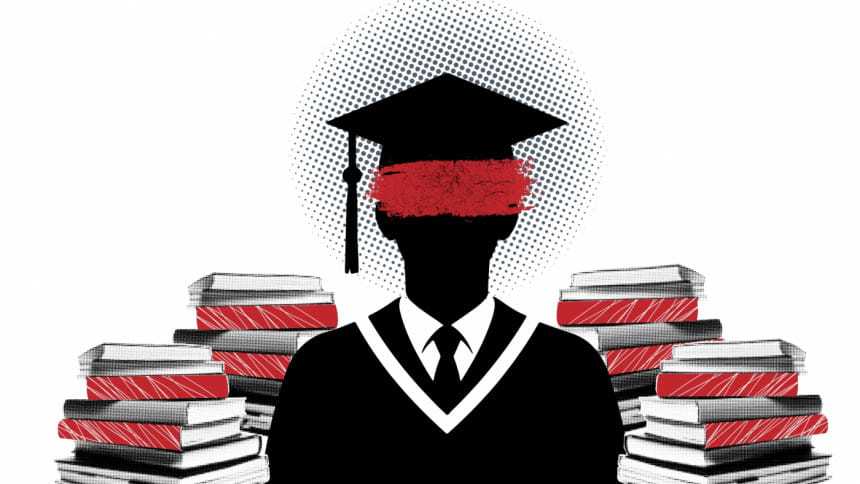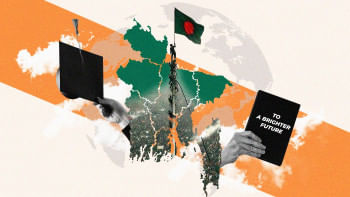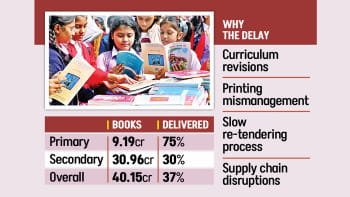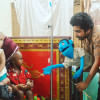Looking back at the wasted potential of educational reforms

The National Education Policy 2010 is on its way out with the interim government describing it as "improper and unimplementable". In fact, most education policies that have been implemented in the past were not particularly effective. While several variables contributed to how ineffective they were, a lack of foresight and enforcement were arguably the most prominent factors.
The National Education Policy 2010, unlike its predecessors, introduced mandatory pre-primary education, launched new subjects focusing on Bangladeshi history and culture, and stated that there will be no room for physical punishment in educational institutions. Other progressive policies included promises of training teachers, expanding scholarship opportunities, and plans to increase vocational education.
In as little as five years, it was evident that the groundbreaking experiment had not taken several confounding variables into account. The ambitious scheme to extend mandatory primary education to eighth grade was halted by resource shortage and complicated by the inauguration of the Junior School Certificate (JSC) and the Primary Education Completion (PEC) exams.
While both the national exams were scrapped in 2023, they introduced their fair share of burden in the education sector. Education specialists argued that they enforced rote memorisation among young learners and commercialised education through guidebooks and mushrooming coaching centres. Toxic competition also thrived among students and their parents as they raced to get the coveted GPA 5 by whatever means possible. In the process, question leaks for primary exams became a pervasive issue. The integrity was compromised within the exam hall as well with students resorting to cheating from their peers.
Witnessing such unscrupulous practices so early on in life definitely did not do favours to impressionable young minds and their developing sense of ethics. Similarly, it had adverse effects on their self-esteem when undesirable grades were revealed, with reports emerging of students inflicting harm on themselves.
The proposed creative system of evaluation was another failed scheme. Despite the policy proposal emphasising the preceding system's fixation on rote learning, students still crammed guidebooks which had an endless supply of "creative questions". They did it hoping to face similar content in the exams.
Furthermore, many of the policies that were supposed to help teachers and seemed perfect on paper remained unimplemented. For instance, the training of teachers – that was proposed but not executed – left them perplexed and unable to adhere to the changes. In fact, they were blatantly disregarded by downgrading their salaries instead of delivering the promised increase.
However, it would not be a fair analysis without acknowledging what the 2010 policy managed to achieve. Some notable ones include the commendable initiative to provide textbooks and monthly stipends to students, which did wonders to increase school enrolments and reduce the drop-out rate. Information and Communication Technology (ICT) education was implemented from secondary to higher secondary level to fulfil the government's Digital Bangladesh dream. Women's literacy rates remained consistently high across the nation.
Nonetheless, an overhaul of the curriculum was designed in 2022, with the objective to modernise the current system. No tests until third grade, no public exams until the tenth grade, and timed exams replaced with year-end evaluations were some of the radical changes the administration proposed. Most of them were met with mixed reviews. While the new assessment process did take some pressure off students, parents and teachers remained sceptical.
The efficacy of educational policies is not easy to quantify, but national and international data do not paint an optimistic picture. According to a UNICEF report from 2020, only 33 percent of children in third grade had the expected reading level for their respective grade while just 18 percent had the expected level of numeracy skills. The same report revealed that 65 percent of children had finished lower secondary education, while only 29 percent completed higher secondary education.
The urban-rural divide was reflected in education as well. Around 80 percent of children who did not conclude each level of education lived in rural areas. Bangladesh also ranked 112th out of 138 countries in the Global Knowledge Index 2020, the lowest in South Asia. With 15 years of lofty aspirations influencing unsuccessful experiments, it's safe to say that the previous regime's education policies has failed to make a lasting impact.
You can reach Ziba at [email protected]
References:
The Daily Star (February 3, 2016). Education Policy - Excellent on paper
UNICEF (2020). Bangladesh Education Fact Sheets 2020
Ministry of Education (2010). National Education Policy 2010. Government of the People's Republic of Bangladesh

 For all latest news, follow The Daily Star's Google News channel.
For all latest news, follow The Daily Star's Google News channel. 










Comments